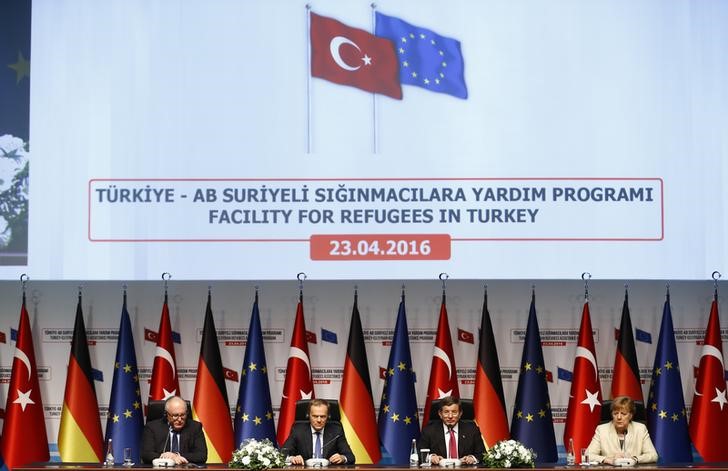By Alastair Macdonald
BRUSSELS (Reuters) - The deputy head of the European Commission insisted on Thursday that the EU executive would not lower its standards to offer visa-free travel to Turks in the coming weeks as part of a deal to stem migration.
"We will not play around with those benchmarks," First Vice President Frans Timmermans told the European Parliament, referring to 72 criteria Turkey must meet if its citizens are to be allowed to travel to the EU without obtaining a visa first.
"The onus is on Turkey," he said. "They say they can do it."
The Commission is due to decide on Wednesday whether to recommend to member states to grant by the end of June the visa waiver scheme which the bloc offered Ankara as part of a deal in March by which Turkey is now taking back refugees and migrants who reach Greek islands from its shores.
Timmermans noted concerns raised by lawmakers during the session about curbs on media freedoms and human rights in Turkey but argued that opening further discussions on eventual Turkish membership of the EU -- another element of the migrant deal -- would be a way to engage Ankara and convince it to change tack.
"If they want to come close to the European Union so badly let them prove that they can," the former Dutch foreign minister said. "The distance between us and Turkey is not decreasing it is increasing because of human rights, the media and what is happening in civil society."
The prospect of easing visa requirements for 75 million Turks has prompted unease in Europe at a time when governments are under pressure to curb immigration. Envoys from the 28 member states met in Brussels on Thursday to discuss the issue.
France and Germany proposed inserting a special mechanism into visa waiver deals, diplomats said, to give the EU a rapid legal means of suspending the freedom if, for example, there were an unexpected surge in people arriving from a country.
The envoys were also looking at how governments might respond to a Commission recommendation to ease travel for Turks at the same time as they review similar pending recommendations made for Georgians and Ukrainians.
"So, 125 million people possibly entering the EU without a visa -- is that an easy message to convey to European citizens in the current context?" one diplomat said of the discussion.
Timmermans stressed that the agreement with Turkey had been essential to stemming the chaotic inflow of migrants and refugees and said a Turkish visa waiver programme could improve, not weaken, European security by obliging Turks to use machine-readable, biometric passports to benefit from the scheme.

"The agreement with Turkey in my view is the only way forward to solve that problem," he said. "Those who criticise the agreement have never ever given me an alternative we could work with."